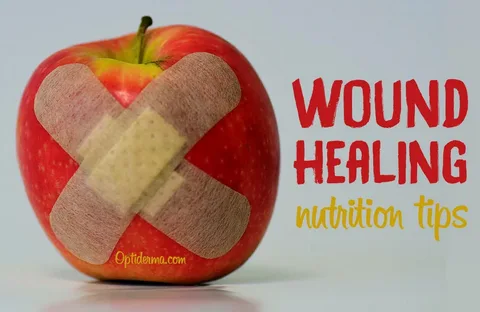Healing from wounds is a natural process. But your body needs the right support to do it well. When you have a cut, burn, or injury, it’s not just about cleaning the wound. What you eat and how you care for your body plays a huge role in how fast and how well you heal. In this article, we’ll explore the top nutrients and daily habits that help speed up wound healing.
Why Proper Healing Matters
When wounds don’t heal properly, it can lead to infections, scarring, or even long-term damage. This is especially true for people with diabetes, poor immunity, or chronic health issues. That’s why giving your body the right tools to heal is so important.
Let’s start with nutrients that help wounds heal faster.
- Protein: The Building Block
Protein helps build and repair tissues. It’s essential for new skin growth and wound closure. Without enough protein, healing slows down.
Best sources of protein:
- Eggs
- Chicken
- Fish
- Beans
- Tofu
- Nuts and seeds
Try to include a source of protein in every meal, especially after an injury.
- Vitamin C: Collagen Booster
Vitamin C plays a major role in producing collagen. Collagen is a protein that helps close wounds and form new skin. It also reduces inflammation and protects against infection.
Vitamin C-rich foods:
- Oranges
- Strawberries
- Bell peppers
- Broccoli
- Tomatoes
If your wound is slow to heal, consider adding more of these foods to your diet.
- Zinc: The Healing Mineral
Zinc helps with cell growth and immune support. It plays a direct role in wound healing by helping new cells form quickly.
Top sources of zinc:
- Meat
- Dairy
- Pumpkin seeds
- Whole grains
- Chickpeas
Even a mild zinc deficiency can slow down wound recovery.
- Vitamin A: Skin Repair Hero
Vitamin A helps repair skin tissues and strengthens the immune system. It also reduces the risk of infections in open wounds.
Best food sources:
- Sweet potatoes
- Carrots
- Spinach
- Kale
- Mangoes
Eating more colorful vegetables is an easy way to get your daily dose of vitamin A.
- Iron: For Oxygen Delivery
Iron helps carry oxygen in the blood. Your skin needs oxygen to heal. A lack of iron can cause tiredness and delay healing.
Good sources of iron:
- Red meat
- Spinach
- Lentils
- Quinoa
- Fortified cereals
Vitamin C helps absorb iron, so pairing both in meals is a smart choice.
- Omega-3 Fatty Acids: Reduce Inflammation
Omega-3s are healthy fats that lower inflammation and support skin health. They also improve blood flow, which speeds up healing.
Great sources of Omega-3s:
- Salmon
- Flaxseeds
- Walnuts
- Chia seeds
- Avocados
Try to eat fatty fish twice a week or take a fish oil supplement if needed.
Red Light Therapy and Wound Healing
In addition to nutrients, modern therapies can boost healing. Celluma Red Light Therapy is one such method. It uses low-level light to stimulate the skin’s natural repair process. It increases blood flow and reduces inflammation. This helps wounds heal faster and better. Many people use it to treat minor cuts, acne scars, and even post-surgery wounds. It’s a safe and non-invasive option to consider.
Top Habits That Boost Healing
Now that we’ve covered the nutrients, let’s look at the daily habits that support your body’s healing power.
- Stay Hydrated
Water helps transport nutrients throughout your body. It also flushes out toxins. Drink at least 6–8 glasses of water a day to keep your skin hydrated and support wound healing.
- Get Enough Sleep
Your body repairs itself during sleep. A lack of sleep can slow down cell growth and tissue repair. Aim for 7–9 hours of rest each night to support healing.
- Avoid Smoking and Alcohol
Smoking reduces oxygen supply and slows blood flow to wounds. Alcohol weakens your immune system. Both delay healing and increase the risk of infections. Avoid them during recovery.
- Keep the Wound Clean
Clean your wound gently with water and mild soap. Don’t use harsh alcohol or hydrogen peroxide unless advised by a doctor. Always keep the wound covered and change dressings regularly.
- Don’t Pick Scabs
Scabs are nature’s way of protecting a healing wound. Picking at them can reopen the wound and lead to scars or infection. Let the scab fall off naturally.
- Manage Stress
Too much stress affects your immune system and delays healing. Practice deep breathing, meditation, or gentle exercise to stay calm and support your body.
Final Thoughts
Wound healing is more than just first aid. What you eat and how you live can speed up recovery and reduce the chance of complications. Make sure your body gets enough protein, vitamins, and minerals. Drink plenty of water, sleep well, and consider non-invasive therapies like Celluma Red Light Therapy for added support.
Whether you have a small cut or are recovering from surgery, taking care of your health from the inside out makes all the difference. Healing is a team effort between your body and your habits—so give your body the best tools to do its job right.



